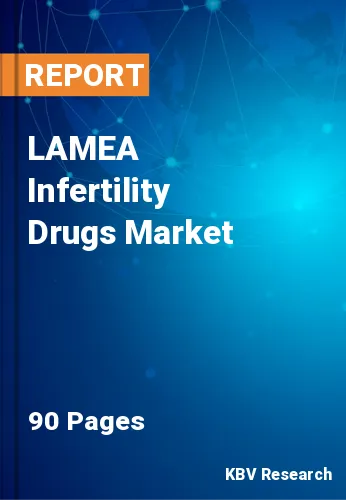The Latin America, Middle East and Africa Infertility Drugs Market would witness market growth of 8.8% CAGR during the forecast period (2022-2028).
Hormonal treatment is used during ovulation induction to encourage the release of eggs or ovulation. Historically, these medications were developed to help women who had irregular menstrual periods or who could not ovulate naturally. Creating a single, healthy egg was the aim.
Increased odds of conception were achieved by using ovulation induction to boost the number of eggs maturing in a single cycle. Injectable drugs were the original treatment agents, which were initially employed for in vitro fertilization (IVF) and afterward for less complicated procedures. These medications come with a higher chance of multiple pregnancies, ovarian hyperstimulation, and a higher price tag and time commitment.
Ovulation induction and intrauterine insemination are usually coupled in ovulatory females. Ovulation induction shouldn't proceed until a comprehensive assessment has been completed. Prior to using fertility medications to induce ovulation, hormone problems such as thyroid dysfunction should be addressed.
Nearly 60% of all instances of infertility are attributed to male factors, and 30–50% of these cases are still idiopathic. About 22.6% of males in the area of the Middle East and North Africa (MENA) who are of reproductive age have male infertility. Numerous variables, such as endocrine disruption, exposure to chemicals, lifestyle choices, and genetic and epigenetic changes, contribute to male infertility. Due to the high frequency of male infertility in the MENA area, it is crucial to investigate the effect, as a genetic aberration is a major factor in the pathogenesis of male infertility. As a result, the market for infertility drugs in LAMEA is growing due to the region's increasing infertility cases.
The Brazil market dominated the LAMEA Infertility Drugs Market by Country in 2021; thereby, achieving a market value of $81.3 million by 2028. The Argentina market is showcasing a CAGR of 9.4% during (2022 - 2028). Additionally, The UAE market would register a CAGR of 8.5% during (2022 - 2028).
Based on End User, the market is segmented into Women and Men. Based on Distribution Channel, the market is segmented into Hospital Pharmacy, Specialty & Retail Pharmacy, and Online Pharmacy. Based on Drug Class, the market is segmented into Gonadotropins, Aromatase Inhibitors, Selective Estrogen Receptor Modulators (SERMs), Dopamine Agonists, and Others. Based on countries, the market is segmented into Brazil, Argentina, UAE, Saudi Arabia, South Africa, Nigeria, and Rest of LAMEA.
Free Valuable Insights: The Worldwide Infertility Drugs Market is Projected to reach USD 4.8 Billion by 2028, at a CAGR of 6.2%
The market research report covers the analysis of key stake holders of the market. Key companies profiled in the report include Abbott Laboratories, Bayer AG, Novartis AG, Merck & Co., Inc., Pfizer, Inc., Teva Pharmaceuticals Industries Ltd., Sanofi S.A., Ferring Holdings SA, Organon & Co. and Mankind Pharma Ltd.
By End User
By Distribution Channel
By Drug Class
By Country
Our team of dedicated experts can provide you with attractive expansion opportunities for your business.

